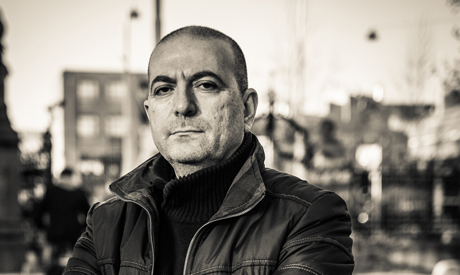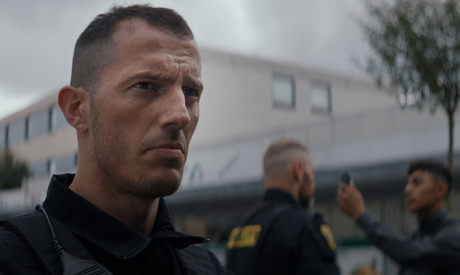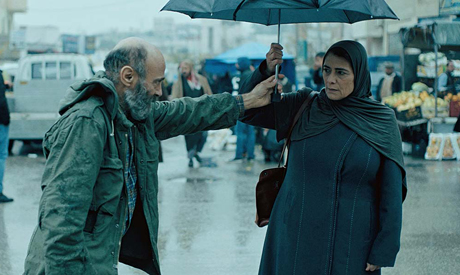It is clear the worldwide refugee crisis has become a preferred topic of film production companies in recent years. With both the refugee’s memories of what is left behind and the difficulties they face in their new environment, the topic provides a filmmaker with plenty of drama. But it is not so much this as the political fact that refugees are burdening European societies that this preference reflects, since under the circumstances films about refugees are not only commercially viable but also a way to counter racism and xenophobia.
In the 42nd Cairo International Film Festival (CIFF, 2-10 December), immigration comes up all across the programme. Written and directed by Bulgarian filmmaker Ivaylo Hristov, Fear – in the official selection out of competition – is one such film. Though shot in black and white, the film doesn’t have a specific historical setting. It is set in a remote Bulgarian village near the Turkish border where illegal immigrants cross into Europe.
The protagonist Svetla (Svetlana Yancheva) is a widowed teacher at the local school who, having become jobless, is waiting for the government to reassign her. While hunting wild rabbits she spots an African refugee, Bamaba (Michael Flemming), making his way through the woods under heavy rain. She arrests him with a view to handing him to the border patrol.
But, since they are busy dealing with a group of Afghani immigrants, she is forced to take him. Svelta speaks only Bulgarian, Bamaba attempts to communicate in English, and yet as they spend time together their connection develops into a love story. The lack of a common language is employed rather as a comic device to make fun of the villagers’ racism and ignorance. Fear won the Grand Prize at the Tallinn Black Nights Film Festival last month in Estonia.

Abu-Assad
In the international competition, Danish filmmakers Frederik Louis Hviid and Anders Ølholm’s Shorta (Arabic for police) opens with the violent arrest of an Arab teenager called Talib Ben Hassi in Copenhagen. Recalling what happened to George Floyd in Minneapolis in the United States, Ben Hassi ends up dead as a result of the way he is handled.
The film shows the two police officers responsible moving through the Arab neighborhood. Mike (Jacob Lohmann) is aggressive and racist while Jens (Simon Sears) is humane and discreet. The story starts while Ben Hassi is in a critical condition at the hospital. At that time Jens is ordered by the head of the police to accompany Mike in a police patrol in order to control his aggressive behaviour.
The story revolves around the rapid development of the situation when an argument takes place between Mike and a young Arab boy, called Amos, which results in his arrest. Meanwhile news of Ben Hassi’s death leads to riots. The two officers are caught in the middle, their lives seemingly at stake. The police chasing Arab teenagers, and then Arab teenagers chasing the police make for brilliantly shot scenes.
When Mike is injured the nurse who ends up looking after him in her own flat turns out to be Amos’s mother. The script’s reliance on a coincidence like this is but one example of dramatic flaws that might prevent Shorta from winning an award at CIFF even though it won the best director and FIPRESCI awards at the Thessaloniki Film Festival.

Shorta
Also in the international competition is the twin filmmakers Tarazan and Arab Nasser’s Gaza Mon Amour, which beyond being the mandatory annual Palestine feature has a genuine chance of winning awards this year.
It is a romantic love story set in a refugee camp in Gaza that never directly mentions the political situation. Issa (Salim Dau) is an elderly fisherman who lives a monotonous life fishing and selling fish. A bachelor in his early 60s, Issa is lonely and in love with Siham (Hiam Abbas) who works in a clothing shop in the same market, though his sister Manal (Manal Awad) is trying to find him a wife. The script beautifully frames his loneliness by having his best friend emigrate.
The film shows humour in the exchanges between brother and sister and in the antics of Hamas leaders who bungle a military ceremony and have him arrested for hiding an ancient Greek statue of Apollo that he finds in the water, though it turns out they are eager to sell it. Gaza Mon Amour premiered in the Orizzonti competition at the Venice Film Festival and it won the NETPAC Award at the Toronto Film Festival and was chosen to represent Palestine at the Academy Awards in 2021.

Gaza Mon Amour
The Palestinian issue was also at the heart of a video conference with Palestinian Golden Globe winner Hani Abu Assad mediated by Egyptian filmmaker Marwan Hamed. Born in 1961 in Nazareth, Abu Assad studied aerodynamics in the Netherlands, working as a aeroplane engineer from 1982 to 1990, when he started assisting Palestinian filmmaker Rashid Mashharawi, with whom he cofounded Ayloul Film Productions.
Influenced mainly by Egyptian filmmakers like Hussien Kamal, Salah Abu Seif, Tawfik Saleh, Kamal Al-Sheikh and Youssef Chahine, Abu Assad explained how it was often hard to find the films he wanted to see growing up in Israel where the authorities often sought to cut the population’s links with its Arab neighbours. Praising the Egyptian film industry, he cited an award-winning Spanish film that he felt was copied from Kamal’s masterpiece Adrift on the Nile.
Abu-Assad also recalled his experience winning the Golden Globe for Paradise Now in 2005 – a feat so unexpected it felt as make-believe as being on a film set – and how the 2013 Omar’s Oscar nomination opened a tiny space for Arab cinema on the international scene. While filming Paradise Now, he recalled, he was so thoroughly harassed by the Israeli authorities he developed paranoid symptoms – and that is when the idea for Omar took shape.
In 2017, he said, working on the Hollywood production The Mountain Between Us starring Kate Winslet and Idris Elba was a totally different experience – his first ever focusing on nothing but directing and managing the actors. He also expressed his enthusiasm for working as a co-producer with Egyptian filmmaker Mohamed Diab on the latter’s film Amira, to be released in 2021.
*A version of this article appears in print in the 10 December, 2020 edition of Al-Ahram Weekly.
Short link: